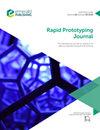A novel approach on artificial aging of nylon 12 powder for laser powder bed fusion
IF 3.4
4区 工程技术
Q1 ENGINEERING, MECHANICAL
引用次数: 0
Abstract
Purpose This study aims to address challenges in the Laser Powder Bed Fusion process of polymers, focusing on the considerable amount of unsintered powder left post-printing. The objective is to understand the altered properties of this powder and find solutions to improve the process, reduce waste and explore reusing reprocessed powder. Design/methodology/approach A novel methodology is used to generate reprocessed powder without traditional printing, reducing time, cost and waste. The approach mimics the ageing effects during the printing process, providing insights into particle size distribution and thermal behaviour. Findings Results reveal insights into artificial ageing, showing an 8.2% decrease in particle size (60.256–69.183 µm) and a 9.1% increase in particle size (17.378–19.953 µm) compared to unsintered powder. Thermal behaviour closely mirrors used powders, with variations in enthalpy of fusion (−0.55% to 2.69%) and degree of crystallinity (0.19% to 2.64%). The proposed methodology produces results that differ from those due to printing under 3% from a thermal point of view. The new process reduces the time needed for aged powder, contributing to cost savings and waste reduction. Originality/value The study introduces a novel method for reprocessed powder generation, deviating from traditional printing. The originality lies in artificially ageing powders, providing comparable results to actual printing. This approach offers efficiency, time savings and waste reduction in the Laser Powder Bed Fusion process, presenting a valuable avenue for further research.用于激光粉末床熔融的尼龙 12 粉末人工老化新方法
目的 本研究旨在解决聚合物激光粉末床熔融工艺中的难题,重点关注打印后留下的大量未烧结粉末。目的是了解这些粉末的变化特性,并找到改进工艺、减少浪费和探索再利用再加工粉末的解决方案。设计/方法/途径采用一种新颖的方法,在没有传统印刷的情况下生成再加工粉末,从而减少时间、成本和浪费。结果结果表明,与未烧结粉末相比,人工老化粉末的粒径(60.256-69.183 微米)减少了 8.2%,粒径(17.378-19.953 微米)增加了 9.1%。热行为与所用粉末密切相关,熔化焓(-0.55% 至 2.69%)和结晶度(0.19% 至 2.64%)均有变化。从热学角度来看,拟议方法产生的结果与低于 3% 的印刷结果不同。新工艺缩短了老化粉末所需的时间,有助于节约成本和减少浪费。其独创性在于对粉末进行人工老化,从而获得与实际印刷相当的效果。这种方法在激光粉末床融合工艺中提高了效率、节省了时间并减少了浪费,为进一步研究提供了宝贵的途径。
本文章由计算机程序翻译,如有差异,请以英文原文为准。
求助全文
约1分钟内获得全文
求助全文
来源期刊

Rapid Prototyping Journal
工程技术-材料科学:综合
CiteScore
8.30
自引率
10.30%
发文量
137
审稿时长
4.6 months
期刊介绍:
Rapid Prototyping Journal concentrates on development in a manufacturing environment but covers applications in other areas, such as medicine and construction. All papers published in this field are scattered over a wide range of international publications, none of which actually specializes in this particular discipline, this journal is a vital resource for anyone involved in additive manufacturing. It draws together important refereed papers on all aspects of AM from distinguished sources all over the world, to give a truly international perspective on this dynamic and exciting area.
-Benchmarking – certification and qualification in AM-
Mass customisation in AM-
Design for AM-
Materials aspects-
Reviews of processes/applications-
CAD and other software aspects-
Enhancement of existing processes-
Integration with design process-
Management implications-
New AM processes-
Novel applications of AM parts-
AM for tooling-
Medical applications-
Reverse engineering in relation to AM-
Additive & Subtractive hybrid manufacturing-
Industrialisation
 求助内容:
求助内容: 应助结果提醒方式:
应助结果提醒方式:


